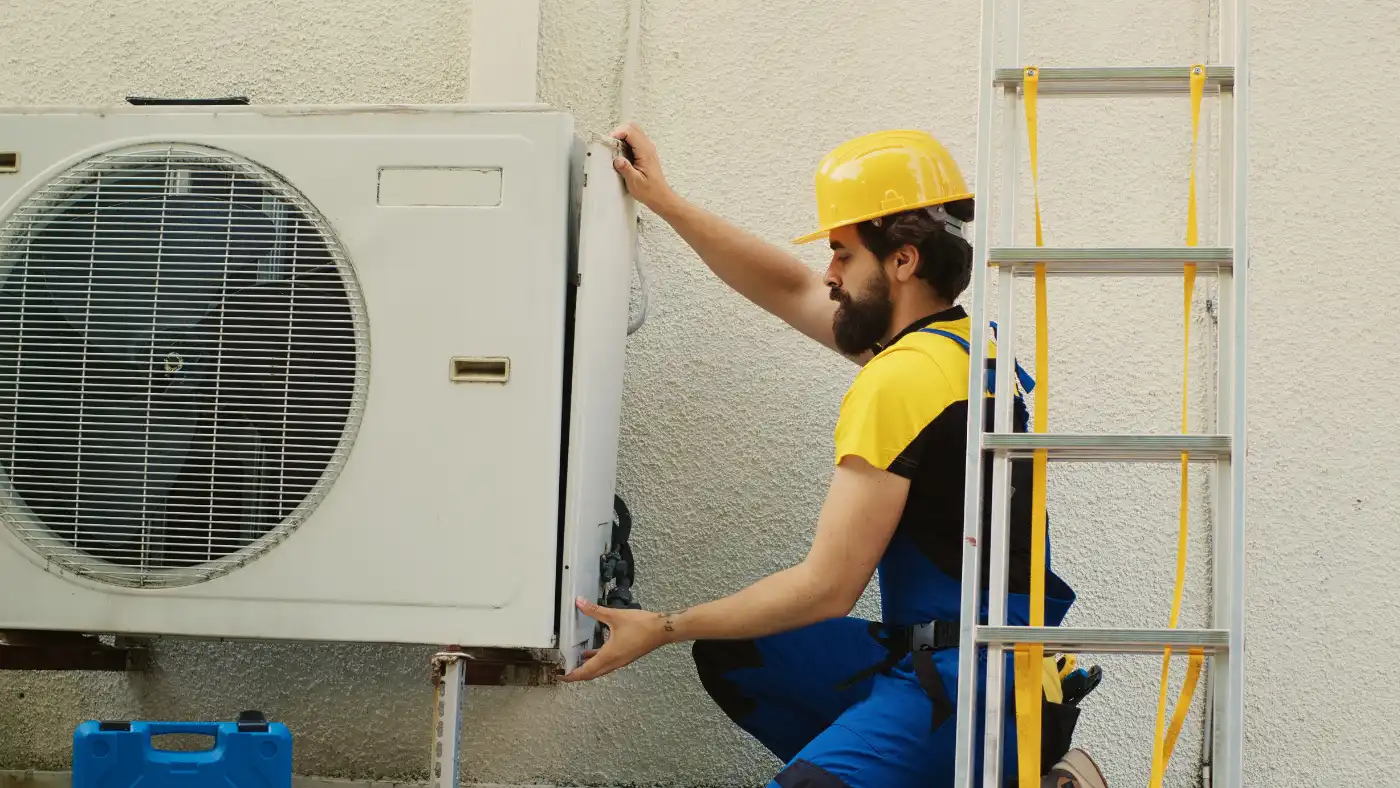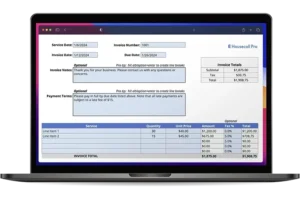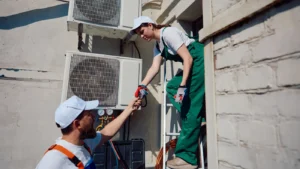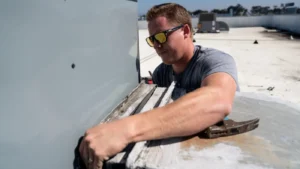
Want to see your potential revenue?
See what businesses like yours earn with Housecall Pro in 1 - 2 minutes.

HVAC is one of the most accessible skilled trades, offering strong job demand, solid pay, and clear entry points. Whether you’re just starting your career or pivoting from another job, the path to certification can be faster than you think. Depending on your goals, you can complete an HVAC certificate program in as little as six months, start earning while you learn through an apprenticeship, or pursue a two-year associate degree for broader training.
Below, we’ll break down the timeline for each option and what you’ll need to get licensed, certified, and on the job.
HVAC certification timeline: different paths
There’s no one-size-fits-all timeline for getting HVAC certified. The right path depends on how quickly you want to start working, whether you prefer hands-on experience, and your long-term career goals. Here’s a breakdown of the most common training options and how long each typically takes.
| Training path | Time to complete | Cost* |
|---|---|---|
| Certificate program | 6-12 months | $1,500-$15,000 |
| Diploma program | 9-15 months | $1,500-$15,000 |
| Associate degree | 2 years | $15,000-$35,000 |
| Apprenticeship | 3-5 years | $500-$2,000 (fees) |
*Costs according to the New England Institute of Technology.
Certificate programs (6-12 months)
Certificate programs are the fastest route to an HVAC career. You’ll typically spend 600 to 900 hours in classroom and lab settings, learning practical job skills through hands-on training. You’ll cover the fundamentals: HVAC systems, safety protocols, troubleshooting, and basic electrical work.
These programs are usually available through trade schools and technical colleges, and they often come with flexible schedules designed for working adults. If you want to enter the workforce quickly, a certificate program is a great starting point.
| Pros | Cons |
|---|---|
| Fastest path to entry-level HVAC work | Limited depth compared to other programs |
| Flexible scheduling for working adults | May not be as competitive for advanced roles |
| Lower cost than other options | Credits may not transfer toward a degree |
Diploma programs (9-15 months)
Diploma programs include all the same things as a certificate program, but usually go further with coursework in system design, customer service, and environmental regulations. They provide a more well-rounded education that can give you an edge when applying for jobs.
If you’re serious about long-term career growth but still want to hit the ground running quickly, this is a strong middle ground.
| Pros | Cons |
|---|---|
| Includes all certificate-level training plus more advanced topics | Slightly more expensive and time-intensive than certificate programs |
| Better preparation for job interviews and real-world scenarios | Still limited in general education or business training |
| Still relatively quick to complete | Credits may not transfer toward a degree |
Associate degrees (2 years)
An associate degree offers the most comprehensive HVAC education, combining technical training with courses in math, communication, and business. You’ll still learn the core fundamentals you’d find in certificate and diploma programs, but with added depth.
This path is especially good if you’re considering moving into management, starting your own HVAC business, or eventually completing a four-year college program. Choosing this route may also qualify you for federal financial aid, helping offset the longer timeline. Plus, the credits you earn can often transfer toward a bachelor’s degree if that’s something you decide to pursue later on.
| Pros | Cons |
|---|---|
| Most comprehensive training option | Longer time commitment |
| Includes business, communication, and math skills | Higher tuition costs |
| Credits can transfer to a four-year degree | Not necessary for entry-level positions |
Apprenticeships and on-the-job training (3-5 years)
Schooling isn’t your only route to working in the HVAC industry. An HVAC apprenticeship combines paid work with classroom learning, usually through a union or employer, such as the Air Conditioning Contractors of America (ACCA). Apprentices usually work under a licensed technician while attending classes at night or on weekends.
You can expect an HVAC apprenticeship to take around three to five years, depending on the program. Though you’ll earn while you learn, your wages will be lower than a certified HVAC tech—typically starting at around $15 to $20 per hour compared to the $25 to $35 per hour that fully certified HVAC technicians often make. However, your pay will gradually increase as you gain experience and complete training milestones.
After finishing your apprenticeship, you’ll be eligible to complete your state’s licensing requirements and start your HVAC career. This route takes longer than the others, but it offers valuable real-world experience and a reliable path to long-term employment.
| Pros | Cons |
|---|---|
| Earn while you learn | Takes the longest to complete |
| Gain real-world, on-the-job experience | Starting wages are low |
| Often leads directly to full-time employment | May require union membership or meeting specific prerequisites |
Key certifications you’ll need
Before you can start working as an HVAC tech, you’ll need a few key certifications. Some are legally required, while others can help you stand out, earn more, and open doors to specialized roles. Here’s a breakdown of the most important certifications to know.
EPA Section 608 certification
EPA 608 certification is a federal requirement for all HVAC techs handling refrigerants, which are an integral part of cooling units. While it’s not legally required for all HVAC work—such as ductwork or basic system installation—having this certification is a major advantage. Many employers expect it, and you’ll need it if you want to service, maintain, or dispose of units that contain refrigerants.
There are four types of EPA Section 608 certification:
- Type I: Small appliances (e.g., window air conditioners, refrigerators, freezers)
- Type II: High-pressure systems (e.g., residential and commercial air conditioners, heat pumps)
Type III: Low-pressure systems (e.g., chillers, industrial HVAC systems) - Universal: Covers all three
Most technicians get Universal certification, as it allows them to work across all equipment types and meets employer expectations. If you specialize in one area (like residential systems), getting only one of the types might be enough, but having Universal shows you’re fully qualified and gives you the most flexibility.
To get your certification, you’ll need to pass a written exam. Many schools include prep courses, and some allow you to take the test on-site. Most people spend 1–2 weeks preparing, but the amount of time you study is ultimately up to you.
Industry certifications
Though not required, industry certifications can help you stand out and earn more.
The NATE (North American Technician Excellence) certification is widely respected in the trade. You’ll choose a specialty, like air conditioning or gas furnaces, and take a core knowledge test plus a specialty exam. It usually requires 2–4 weeks of prep time and is a great choice for techs with at least a year of field experience.
The HVAC Excellence certification is another valued credential that can boost your credibility. The program offers certifications for both students and experienced technicians, with exams tailored to different skill levels. Some exams require proctoring or verified work history, so plan ahead if you plan to pursue these credentials. Most candidates spend 2 to 3 weeks preparing, depending on the level of the exam.
Manufacturer training
Top HVAC manufacturers like Carrier and Trane offer short courses and certifications for their systems. These can help you specialize and build credibility—especially if you plan to work on those branded units. In some cases, completing these courses can help you qualify for brand-authorized repair work or boost credibility with certain employers.
Some brands require certification before allowing techs to service certain systems under warranty. If you plan to specialize in one brand or work with a company that does, these trainings can be a smart investment.
State licensing requirements
HVAC certification isn’t the same as a license. A certification proves you’ve learned specific technical skills, like handling refrigerants or passing a recognized industry exam. You’ll also need a license to legally work on HVAC systems, pull permits, or operate a business.
HVAC license requirements vary by state but often include:
- Completion of an approved training program
- A specific number of supervised work hours or an apprenticeship
- Passing a state or local exam
Working without a proper license could mean fines or lost job opportunities, so make sure you understand the requirements thoroughly.
What affects how long HVAC certification takes?
How long it takes to get certified isn’t the same for everyone. A handful of factors can speed you up (or slow you down):
- Full-time vs. part-time: If you commit to full-time study, you’ll be able to complete training more quickly. Part-time schedules are 100% doable, but it’ll take you a little longer to finish.
- State licensing rules: Each state sets its own requirements for training hours, exams, and certifications. These can add time to the certification process, depending on where you live.
- Previous experience: If you’ve served in the military (especially in mechanical or engineering roles), have a construction background, or have completed trade school credits, you might be able to skip certain requirements or accelerate your training.
- Online vs. in-person: Online programs are flexible and convenient, but they may take longer if they require in-person labs or externships.
- Job placement programs: Schools with direct ties to employers or union apprenticeships can speed up your transition from training to paid work.
Is HVAC right for you?
If you like fixing things, working with your hands, and figuring out how systems work, HVAC could be a great fit.It’s an excellent job that offers a nice balance of independence, variety, and reliable income, all without a four-year degree.
Plus, it’s a stable long-term career. According to the U.S. Bureau of Labor Statistics, HVAC jobs are projected to grow 9% over the next decade, much faster than the average for other occupations.
To succeed in the HVAC field, you’ll need strong communication and problem-solving skills as well as physical stamina, since you’ll often be working directly with clients and navigating tight or outdoor spaces. If you prefer desk work, predictable schedules, or a super clean environment, HVAC might not be the right fit.
Tips for getting HVAC certified faster
With a little planning, you can shave weeks (or even months) off your HVAC training timeline. Here are a few tips to fast-track your career:
- Study full-time if possible, as this will help you complete the program in the shortest amount of time. Some certificate programs wrap up in as little as six months.
- Start prepping early for the EPA 608 exam. Since you’ll need this certification to work with refrigerants, get a head start by reviewing study guides or taking a prep course before your program ends.
- Look for combined programs that offer certification and licensing prep. Some schools combine technical training with state license exam prep, so you’re ready to hit the ground running when you finish.
- Choose schools with job placement support. Career services can connect you with employers, apprenticeships, or union partners to help you start working faster.
- Explore online options if your schedule isn’t compatible with full-time or in-person learning. These allow you to move at your own pace and often start year-round, so you won’t have to wait for a new semester to begin.
Get In Touch: 858-842-5746
Let us earn your trust
On average, Pros increase monthly revenue generated through Housecall Pro by more than 35% after their first year.
See plan options and feature breakdown on our pricing page.
Next steps toward becoming an HVAC technician
HVAC is one of the fastest paths to working in a skilled trade. With the right training program, you could be out in the field in under a year, building a stable career with room to grow.
Start by exploring local HVAC training programs, comparing certification timelines, and understanding your state’s licensing requirements. You can also check out programs like the Housecall Pro Trade Academy, which connects aspiring pros with training, scholarships, and job placement support. The earlier you map out your path, the faster you can get to work.
As you grow in your career, tools like Housecall Pro can help you stay organized and keep things running smoothly. From quoting and dispatching to invoicing and payments, our HVAC software gives you everything you need in one place—helping to save time, reduce headaches, and grow your business.
FAQ
-
Can you get HVAC certified online?
-
Yes, many schools offer online HVAC training programs that include EPA 608 prep and theory-based instruction. However, some programs require hands-on labs or in-person testing to meet certification standards.
-
What’s the easiest HVAC certification to get?
-
The easiest HVAC certification to get is typically the Type I EPA 608 certification, which covers small appliances like window air conditioners and refrigerators. It requires passing a straightforward written exam and usually takes just a few days of study.
-
How much does HVAC certification cost?
-
HVAC certification costs vary dramatically. Certificate programs usually fall between $1,200 and $15,000. Specific exams, like the EPA 608 exam, are usually less than a few hundred dollars. Many schools offer financial aid, grants, or payment plans to help cover tuition and fees.
-
Is HVAC hard to learn?
-
HVAC can be challenging, but it’s not impossible to learn. Whether you choose a training program or an apprenticeship, you’ll learn everything you need to know, so it’s accessible even if you’ve never worked with tools before. If you’re mechanically inclined, enjoy problem-solving, and are willing to learn, it’s a very achievable path.
-
How do I become an HVAC technician?
-
To become an HVAC technician, you’ll need to complete a training program, earn your EPA 608 certification, and meet any state licensing requirements. Most techs start with a certificate or diploma from a trade school, while others learn through apprenticeships. Once you’re certified, you can start gaining hands-on experience right away and build your career from there.







